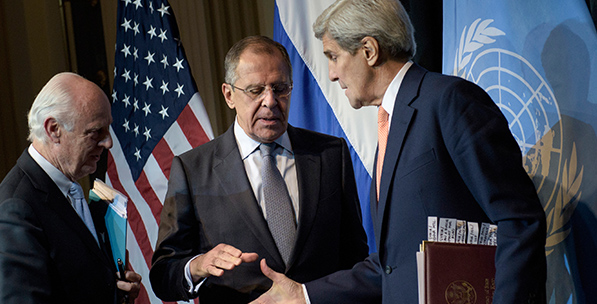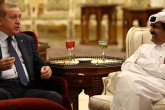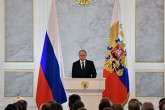Time flies; who would have guessed that Turkey’s multifaceted relations with Russia would receive such a heavy blow within days following the legitimate downing of a fighter jet on the critical Syrian border? Fundamental disagreements on the Syrian quagmire seem to have carried Ankara and Moscow to the limits of their cooperative attitude on all other issues, as Syria rapidly turned into a microcosm of global competition for power between NATO and the Russian-led bloc.
Turkey valued the deepening of her diplomatic, economic and social relations with Russia in the last decade as a matter of geopolitical diversification and multidimensional foreign policy. Intensifying trade and energy collaboration produced crucial gains for Turkey as the dynamism of its export-based economy was stimulated and the country began to be perceived as a major international energy hub. On the other hand, harmonious relations with Russia helped Turkey reach Central Asian Turkic republics with greater ease without having to bother about potential reactions from Moscow. It also constituted a useful bridge toward the BRICS group of emerging powers in order to balance the country’s long-term alliance with Western powers in the context of NATO and the European Union.
Therefore, at the start of the crisis, the messages coming from the political leadership in Turkey – and in particular from President Recep Tayyip Erdoğan, who was the architect of intensive relations with Moscow over the course of the last decade – were aimed at reducing tensions. Erdoğan said that, at the time of the warplane’s downing, the nationality of the fighter jet was unknown by the Turkish Armed Forces, as the Russian pilots did not respond to communication attempts, and expressed his sorrow for the dramatic incident. But Russian President Vladimir Putin’s tendency to use the incident as an excuse to interrupt all forms of collaboration with Turkey and his effort to penalize Ankara in his struggle for power against NATO totally changed the atmosphere.
Particularly, Putin’s blatant breach of diplomatic inclinations by refusing to talk to Erdoğan and his decision to initiate a Soviet-style “black propaganda” campaign against Turkey as an outcast country supporting DAESH through oil purchases deteriorated the relations. In the meantime, comprehensive economic sanctions imposed on Turkish companies exporting fruits and vegetables, textiles and machinery, construction companies operating in Russia and even university students involved in exchange programs reflected the sudden change of attitude in Moscow from deep friendship to animosity. All this understandably created serious concerns about the long-term sustainability of Turkey’s energy collaboration with Russia as the second-major consumer of natural gas after Germany with an annual gas bill of around $16 billion. On the other hand, the future of the Akkuyu Nuclear Power Plant close to Mersin currently being constructed by Russia’s Rosatom – totaling $20 billion of which $3 billion has already been realized – also faced serious uncertainties.Despite Moscow’s antics aimed to discredit Erdoğan and his family in terms of global public opinion as well as the systematic media campaign of its propaganda machine, Turkey refused to reply to the economic and diplomatic sanctions in kind so far. But the mood in Ankara reflects widespread disappointment with the kind of rush and exaggerated response from a strategic partner to an incident, which unveiled Ankara’s decisiveness to protect her national sovereignty in the face of any military intimidation.
What Putin and the Kremlin elite have to understand clearly is that Turkey is not at all helpless against Russian bullying; on the contrary, it could employ numerous alternative options to fill the vacuum that will be created by the Russian absence in its diplomatic and economic network. The critical agreement with Qatar signed during Erdoğan’s visit regarding liquefied natural gas (LNG) imports was the first concrete signal of the effort to diversify energy sources as a precaution against the unreliable stance of Russia. It might take some time, but Ankara seems determined to radically transform its energy mix in which the bulk of the natural gas imports – 55 percent – is made from Russia, predominantly for electricity production. Putin’s sanctions could have a negative, short-term impact on the economy, but Russia might lose a very important economic partner, energy hub and provider of low-cost agricultural produce in return. At a time of economic contraction in the face of falling oil prices and depreciating ruble, additional inflationary pressures due to sanctions against Turkey will not be good news for Russian consumers. We will see how long populist heroism could dominate over economic rationality.
[Daily Sabah, December 5, 2015]
In this article
- Economy
- Opinion
- 2015
- Arabian peninsula
- BRICS
- Central Asia
- DAESH
- Daily Sabah
- Europe
- European Union (EU)
- Germany
- Liquefied Natural Gas (LNG)
- Middle East
- NATO
- Qatar
- Recep Tayyip Erdoğan
- Russia
- Sanctions
- Strategic Partnership
- Syria
- Syrian Civil War
- Syrian Conflict
- Syrian Crisis
- The President of the Republic of Türkiye
- Turkish Armed Forces (TAF) | (TSK)
- Turkish President
- US Sanctions
- Western World


